|

Interview with



Remembering The 20th Century:
An Oral History of Monmouth County
Date of Interview: February 7, 2000
Name of Interviewers: Flora Higgins and Arthur Siegfried, Mr. William
Siegfried's nephew
Premises of Interview: Mr. Siegfried's home, Matawan, NJ
Birthdate of Subject: August 17, 1896
Deceased: May 25, 2001
Flora Higgins: Good
afternoon, Mr. Siegfried and welcome to the project. Would you tell us a
little bit about how your people happened to get to New Jersey, how your
family got to Monmouth County?
William Siegfried:
Well, my father worked for the government as a clothing inspector. He
inspected work of the various manufacturers whose uniforms used to go
through inspections on Governors Island. Doing this, he became
acquainted with the Eisner's of Red Bank, who were government
contractors.
Flora Higgins: I
interviewed a lady from Union Beach who was in her late eighties. She
remembers taking the trolley to Eisner's. That was a very old name in
Red Bank.
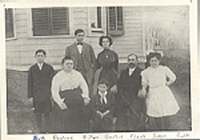 |
| The Siegfried Family, 1910. (Left to right) William, Pauline, Milton, Gertie, Frank, Simon, and
Ruth |
William Siegfried: Oh, sure,
yes.
Flora Higgins: Can
you tell us what it was like being a boy in Red Bank at the turn of the
century? What games did you play? Who were your playmates?
William Siegfried:
Well, I started school in Red Bank and graduated from high school.
Flora Higgins: How
did you get to school? Did you have to walk to school? Was it far?
William Siegfried:
No. I only had four or five blocks to walk, and when I went to high
school, that wasn't far. I lived on Linden Place in Red Bank.
Flora Higgins: Can
you tell us a bit more about that school? Did you work pretty hard in
school?
William Siegfried:
Oh, they kept us very busy.
Flora Higgins: Did
you study Latin?
William Siegfried:
Yes.
Flora Higgins: You
were probably just about graduating when World War I started. Would that
be about right?
Arthur Siegfried: He worked at
Eisner's before the war.
William Siegfried:
Yes, I started at Eisner's on a part time basis, and when I graduated
from high school, I assumed permanent employment there. That was my
first employment. From there I started to get acquainted with some
railroad people. I had a brother who was an engineer, and so I assumed
the task of learning telegraphy.
Flora Higgins:
That's a very necessary skill, and in fact, they did not draft
telegraphers did they?
William Siegfried:
Well, telegraphy was even more important than the telephone at that
time.
Flora Higgins: Did
you become a dispatcher?
William Siegfried:
Yes.
Flora Higgins: Do
you know Lester Whitfield?
William Siegfried:
The name is very familiar.
Flora Higgins: His
history is very much like yours in some ways. He learned telegraphy and
then he became a dispatcher; and he's a great proponent of railroads. Do
you think we need more railroads around here?
William Siegfried:
Do we need more? I don't think so; they have plenty of trackage. All
they need is more motor power.
Flora Higgins: And more places
to put the cars when they get to the train station!
Arthur Siegfried: Who else worked in
Eisner's from the family?
William Siegfried:
Well, my father's connection with Eisner's is how we came to move to Red
Bank. We moved to Red Bank from New York City. And I started there while
I was in high school. I used to go there after school for a couple of
hours. And when I graduated high school, I worked there full time.
Flora Higgins: How
much did you get paid?
William Siegfried:
Seven dollars a week.
Flora Higgins: Well,
I hope you didn't spend it all in one place. How did you spend your
money in Red Bank? Was there a movie house in Red Bank?
William Siegfried:
Oh, there were movie houses. Then there was a place they used to call
the YMCA that was down on the border, and they had roller skating there.
Flora Higgins: Did
you like to roller skate?
William Siegfried:
Oh, sure.
Flora Higgins: Oh,
what happened to the YMCA?
William Siegfried: I
used to work there. I would help the people put their skates on and take
them off.
Flora Higgins: This
is the first I have heard of that place. I think it would be nice to
have it now for the young people.
William Siegfried:
Sure, yes, good clean fun.
Flora Higgins: Good
fun. Do you remember any ice boating?
William Siegfried:
Oh, sure. They used to have ice boating in the winter, and then in the
summer there would be sail boating.
Flora Higgins: Does
it seem to you the winters were colder then?
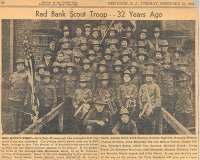 |
| Picture of Red Bank's first
Boy Scout troop. The picture was published in 1942, but was taken in 1910. |
William Siegfried:
Oh yes, we cleaned snow from the sidewalks in the winter time. Broad
Street was a dirt road. The only places that they had the planks were
the crosswalks. So we youngsters used to go down there during the
inclement weather with our mothers' brooms and clean the walks. They had
sidewalks from one side of the road to the other. We used to keep that
clean, and we'd get the pennies from the people going across.
Flora Higgins: Sort
of like a little toll.
Arthur Siegfried: Did Mr. Eisner
give you money when you swept the road?
William Siegfried:
Oh sure, practically everyone would contribute.
William Siegfried:
What did you do with the money then?
William Siegfried:
Oh, I'd give it to my mother, and she would put it away for us. It would
accumulate.
Arthur Siegfried:
Did you go to the cemetery?
William Siegfried: Yes, I
used to go. I used to accompany my father to the cemetery and we would
level off the ground and straighten out the various plots.
Arthur Siegfried:
How old were you then?
William Siegfried:
Oh, eight to ten years old.
Arthur Siegfried:
And where was the cemetery?
William Siegfried:
In Lincroft.
Arthur Siegfried:
And which cemetery was it?
William Siegfried:
Well there was only one cemetery, The Hebrew Burial Ground.
Flora Higgins: Is
that cemetery still there?
Arthur Siegfried:
It's B'nai Israel Congregation Cemetery now, and it is still there. His
father was one of the founders of the cemetery and of the synagogue. How
did you get to the cemetery from Red Bank?
William Siegfried:
Well, there was a family the name of Dixon. They had a buggy and a
horse, and they used to pick us up at Red Bank and take us out there,
and we would do the various chores around the grounds. Then they took us
home.
Flora Higgins: So were the
Dixons involved in founding the cemetery as well as your father?
William Siegfried:
They were one of the originators. When they first bought the ground they
were the promoters.
Flora Higgins: Did
your family have a sense that they were starting up life in a community
that would become the Red Bank like it is today?
William Siegfried: Well, we
used to go to New York from Red Bank every couple of weeks to do shopping.
Flora Higgins: Did
you take the train?
William Siegfried:
Yes.
Arthur Siegfried: Did you drive to
New York, too?
William Siegfried: Oh, yes,
after a while when we were able to, when the cars started coming into
use, we would use the car to go to New York, and we'd go over there, and
my father would do the shopping.
Arthur Siegfried: What did he shop
for?
William Siegfried:
Groceries.
Arthur Siegfried: Why did he go to
New York for groceries?
William Siegfried:
Well, my mother was a great cook and there were a lot of things that
were not obtainable in Red Bank, so he would shop over in New York on
the East side.
Flora Higgins: I
think to this day there are people who need specialty items that go into
New York to get them even now.
William Siegfried: I
wouldn't be a bit surprised, yes.
Flora Higgins: Is
your family any relation to the Siegfried Hardware Store in Atlantic
Highlands?
William Siegfried:
That's my brother.
Flora Higgins:
Really! That's a wonderful store. We used to shop there a lot.
William Siegfried:
Oh, really.
Flora Higgins: Yes,
no matter what you wanted he had it and he knew where it was. It was
wonderful! That was your brother.
Arthur Siegfried: I didn't know
whether you were going to get into any parts of the family, but yes,
Frank was his younger brother.
William Siegfried:
Yes, he started the hardware business in Atlantic Highlands. He started
from scratch.
Flora Higgins: And
when he left he still had things that he had when he had started, I
think. You could always get everything you wanted there.
Arthur Siegfried: Did you ever live
in Highlands?
William Siegfried:
Yes we did. My father got married the second time and his bride had
seven houses there.
Flora Higgins: What
was her name before she married?
William Siegfried: I
don't remember her name.
Flora Higgins: That
seems like a lot of property.
William Siegfried:
She had seven houses, and they would all be rented in the summertime.
Arthur Siegfried: Did she live on
the hill? The road that became the highway.
William Siegfried:
Yes, they were all on that Route 36, not far from the bridge.
Flora Higgins:
Actually, I used to live on Ocean Street. We had a big old Victorian
house on Ocean Street, which is why we needed your brother's store.
William Siegfried:
When I say bridge I'm thinking the current bridge, which is Highway 36,
but I think that was built around 1940. It was the other bridge. Well
amongst those seven houses there was always something to do, and she
kept us busy.
Arthur Siegfried:
When did he marry her?
William Siegfried: I
don't remember the date.
Arthur Siegfried:
Around 1920 or so.
William Siegfried:
Yes.
Arthur Siegfried:
Your mother died quite early on, didn't she? Do you remember how old you
were?
William Siegfried: I
was about fourteen when she passed away, so it was about 1910. Father
got married about three or four years after my mother passed away.
Arthur Siegfried:
Your mother was Pauline, and my middle name is Paul for her. In
Highlands were there people by the name of Schwartz? What can you tell
us about them?
William Siegfried:
Well they had a hardware store on Bay Avenue and Miller Street.
Flora Higgins: By the
Rexall Drug Store, Bedles, remember Bedles?
William Siegfried:
Sure.
Flora Higgins: We lived
in Highlands a long time. I know the hardware store. In fact, the day
that hardware store closed, I went down there and bought some charming
things. We were all sorry when that store closed in the1960s or 1970s
wasn't it? Was that Schwartz'?
William Siegfried: I
don't know. There were other hardware stores there. In the 1960s or
1970s there was one…Kadenbach.
Flora Higgins:
That's the one I'm thinking of!
Arthur Siegfried:
All right, and then there was one, I think it was Banko, which my father
bought out during the Korean War, but that's later. What was the name of
Mr. or Mrs. Schwartz? I don't know if it's the same family, but I think
it is some part. We used to visit one another. We were friends, but not
too close.
Flora Higgins: Who visited
them when you said, "We visited them?" Who's the 'we'?
William Siegfried: Oh, my
father. We used to visit them and gradually built up a friendship.
Arthur Siegfried:
How old were you when you visited them?
William Siegfried: I
was in my teens.
Arthur Siegfried:
Was Harry Schwartz one of their children?
William Siegfried:
Well, Harry was his son. I don't know what's become of them.
Arthur Siegfried:
Now was Harry the one that's Harry Swartz the doctor?
William Siegfried:
Well, the doctor is from another branch in the family.
Flora Higgins: I see
a lot of moving around. You've lived in Red Bank, and then you went to
Highlands, and you went out to Lincroft. That's kind of a big distance
with a horse and carriage and a bicycle.
William Siegfried: Well, we
only made the one move from Red Bank when my father got married the second
time and we moved to Highlands.
Flora Higgins: Do
you remember what street you lived on in the Highlands?
William Siegfried:
Up on the hill. The highway.
Flora Higgins: All the
houses were on the highway, that's right, you already told me that.
William Siegfried:
There was a bridge there, the railroad bridge.
Flora Higgins:
Apparently the trains were pretty important in the Bayshore area. They
came and went to New York bringing people down to rent houses.
William Siegfried:
When I was a youngster, the trains ran all the way through to Long
Branch and down the shore. My new mother had seven houses on the
highway. We used to work on them keeping them in condition.
Flora Higgins: Were
they big houses or small houses?
William Siegfried:
They were average houses. They had five or six rooms--they were the
average size.
Flora Higgins: Did you enjoy
clamming or going down to the river beach, or the ocean?
William Siegfried:
We used to go bathing and fishing.
Flora Higgins: How
old were you when you got married? How did you meet your first wife?
William Siegfried:
Oh, I think I was about eighteen when I met my first wife. We were
introduced by our two friends and we started dating. When I first
got married I was still working for the railroad.
Arthur Siegfried:
And did Milton get you the job on the railroad?
William Siegfried:
Yes.
Arthur Siegfried:
How much older was he than you?
William Siegfried: Oh, he
was about eight or ten years older.
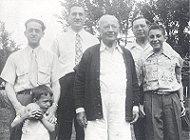 |
| William Siegfried (far
left) with family |
Arthur Siegfried:
And then Aunt Ruth was in there too? Who was the youngest, my father or
Aunt Ruth?
William Siegfried:
Aunt Ruth. Your father was the youngest. Milton was the oldest. And then
me, and then Ruth.
Arthur Siegfried:
And then my father.
William Siegfried:
Yes, your father was the youngest.
Arthur Siegfried:
How long did you live in Highlands with Aunt Bessie, your first wife?
William Siegfried: I
don't think we lived there at all. We lived in Perth Amboy.
Arthur Siegfried:
She was from Perth Amboy wasn't she?
William Siegfried:
Yes.
Arthur Siegfried:
Did you go into business before the Second World War or after?
William Siegfried:
After.
Arthur Siegfried:
Aunt Bessie died around 1940 or 1941, right?
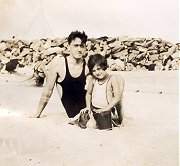 |
|
William Siegfried and his daughter, Thelma
on
beach |
William Siegfried:
Yes.
Arthur Siegfried: And when
was your daughter Thelma born? Did she go in the service in the Second
World War?
William Siegfried:
Yes, she went in as a WAVE.
Flora Higgins: When
you were in Perth Amboy, what business were you in?
William Siegfried:
Auto supplies.
Flora Higgins: About
how long did you live in Perth Amboy?
Arthur Siegfried:
You were in business in Perth Amboy with Al weren't you? He did the
inside work, and you did the running around.
William Siegfried:
Al Allison.
Arthur Siegfried:
Yes, that's the one. You were with him quite a long time.
William Siegfried:
Oh yes, maybe twenty years.
Arthur Siegfried:
Maybe thirty years before you sold out to Calabro, right? How did you
know Aunt Gladys? You knew her from Perth Amboy.
William Siegfried:
Oh, yes. I didn't meet her until after I lived in Perth Amboy.
Arthur Siegfried:
And you got married to her.
William Siegfried:
Yes. I lived on State Street in Perth Amboy. Gladys was a supervisor for
the telephone company.
Arthur Siegfried:
And she was a Dickson, right? A completely different family.
William Siegfried:
Yes. This is a very fine Catholic family from the Manasquan area, but
there is a whole bunch of them. There's many of them. That's the Dickson
Supply Family.
Flora Higgins: Mr.
Siegfried, when you were in Perth Amboy did you know someone named Rabbi
Davidson?
William Siegfried:
Sure. We were well acquainted.
Flora Higgins: Oh,
I'm so happy to hear that.
William Siegfried:
Was he related to you?
Flora Higgins: No,
but his daughter Judith was my friend of the heart. She and I were very,
very, very good friends and she spoke often of her father.
William Siegfried:
Yes, we were very well acquainted.
Arthur Siegfried:
When did you move in here, this house that were in now?
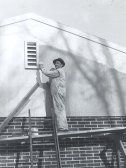 |
| William Siegfried building
his house |
William Siegfried:
Around 1955.
Arthur Siegfried:
Who built this house?
William Siegfried:
Well, I had a friend who was a mason, and I got the plans. I supervised
the whole thing. Bought all my own material.
Flora Higgins: Well,
it's a very beautiful home.
William Siegfried:
Thank you. Aunt Gertie was part of the Monmouth Schwartz family.
Arthur Siegfried:
Which Schwartz family? From Highlands? From Keyport?
William Siegfried:
No, it was Red Bank. It was the Schwartzs in Red Bank that had a used
furniture store.
Arthur Siegfried:
Was that Maurice Schwartz?
William Siegfried:
Yes.
Arthur Siegfried: Is
he the one that went into the car business or was that another one?
William Siegfried: Maurice
went into the car business; it was Schwartz Chrysler. The father had the
furniture business. Maurice Schwartz, the car dealer, was the son of the
brother to Milton's wife.
Arthur Siegfried:
Now were they related to Harry Swartz the doctor?
William Siegfried:
Yes. Harry Swartz is related.
Arthur Siegfried: Do
you remember how they're related?
William Siegfried:
Well, I think it was Harry's father who is the brother to the Schwartz
who owned the furniture store. Aunt Gertie would be a cousin.
Arthur Siegfried: Now were
there other Schwartz' around Keyport?
William Siegfried:
No.
Arthur Siegfried: William
did a lot in Perth Amboy with the Lions Club, and he did a lot with the
Drum and Bugle Corps. He was in the Thanksgiving Parade.
Flora Higgins: Let's
talk about that.
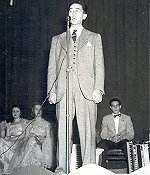 |
| William Siegfried at the
microphone |
Arthur Siegfried:
What did you do in the Lions Club in Perth Amboy?
William Siegfried:
What do you mean?
Arthur Siegfried: Well,
you ran the Drum and Bugle Corps.
William Siegfried:
Yes.
Arthur Siegfried:
Did you organize it?
William Siegfried: Oh,
I had all the working parts. I ran the Drum and Bugle Corps in Perth Amboy.
Arthur Siegfried:
Did you have competitions with other drum and bugle Corps?
William Siegfried:
Oh, sure. I even ran the competitions at the stadium in Perth Amboy. I
had about fifteen drum corps coming in there and competing with one
another.
Arthur Siegfried:
That was around 1945 or 1949.
William Siegfried:
Yes.
Arthur Siegfried: I
remember going up there when my parents lived on Lincoln Avenue, maybe
during the Second World War, because they moved out of there after the
war.
Flora Higgins: Out
of where?
Arthur Siegfried: It
was 50 Lincoln Avenue, Atlantic Highlands. But I remember being picked up
and going to Uncle William's competition. Did you take the drum and
bugle Corps to Washington?
William Siegfried:
Sure.
Arthur Siegfried:
What did you do there?
William Siegfried:
Well, we were at competitions.
Arthur Siegfried:
How about the Macy's Parades?
William Siegfried:
Oh, yes, we went there for many, many years.
Arthur Siegfried:
Was that by invitation?
William Siegfried: Oh, sure.
Arthur Siegfried:
Why did they invite you?
William Siegfried:
Because we were an attraction.
Arthur Siegfried: Right. How
many people were in your corps?
William Siegfried:
We used to run about 105.
Flora Higgins: Good heavens!
That's a big corps. Had you had musical training? Are you a musician?
William Siegfried:
Well I used to have piano lessons when I was a youngster, but I didn't
stick to it very long.
Flora Higgins:
That's a big undertaking.
Arthur Siegfried:
That was a huge thing.
William Siegfried:
Yes, we used to travel all over.
Arthur Siegfried: Was
your mother a good cook?
William Siegfried:
Oh, she was, yes.
Flora Higgins: What
would she cook?
William Siegfried:
Hungarian. She was a very good cook.
Arthur Siegfried:
Did she keep a kosher house?
William Siegfried:
When we first moved to Red Bank, she kept a kosher house, but it wasn't
too long before we switched. It became too difficult to get the right
foods all the time.
Arthur Siegfried:
When you went to New York did you bring back kosher foods?
William Siegfried: Oh, yes.
I used to go by myself and do a lot of shopping.
Arthur Siegfried:
Did you drive a car?
William Siegfried:
In the beginning, I went by train. My father worked up around Westfield,
New Jersey as a ticket agent.
Flora Higgins:
Trains again.
William Siegfried:
Yes.
Flora Higgins: Well,
I see you've done many things: the auto business, and the drum and bugle
Corps, and the train dispatcher. That was your major thing before you
got married, and then you had the auto supply parts. When you and Bessie
wanted to go out in the evening and have fun, where did you go?
William Siegfried:
We used to go out to dinner once in a while. We lived in Perth Amboy. We
used to come to Keyport to Ye Cottage Inn. We used to go there
quite a bit.
Flora Higgins: Great
fish.
Arthur Siegfried: Do
you remember Cooper Bridge from Red Bank to Middletown?
William Siegfried:
Yes.
Arthur Siegfried:
How do you remember that?
William Siegfried:
Well, I remember the name Cooper from way, way back.
Arthur Siegfried: Do
you know who Cooper was?
William Siegfried:
No.
Arthur Siegfried:
Was the highway over the bridge a dirt road?
William Siegfried:
No, it was macadam.
Arthur Siegfried:
When did they start putting macadam on the dirt roads?
William Siegfried:
Oh, I don't remember.
Arthur Siegfried: Do
you remember driving a car with Ruth's husband, Sam, or Saul? Tell us
about that.
William Siegfried:
Well, we used to go to New York every once in a while and do shopping.
Flora Higgins: Do
you remember all the excitement when people began getting television
sets?
William Siegfried:
Oh, sure, yes, and it wasn't long before we had it.
Flora Higgins: How
about airplane travel? Do you remember your first airplane trip?
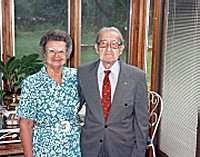 |
William and
his
second wife Gladys Dickson Siegfried |
William Siegfried:
Yes, I remember the first time I went on a plane. It was quite
exciting.
Flora Higgins: I can
imagine. Where did you get on? Where did you go to?
William Siegfried:
We went to Florida for the first time.
Arthur Siegfried:
With Aunt Gladys or Aunt Bessie?
William Siegfried:
Aunt Gladys.
Arthur Siegfried:
You used to tell us a story about being in an old Ford car with Aunt
Ruth and Uncle Sam and the car tilted over.
William Siegfried:
Oh yes. He had this old Model T, and some of the gears had worn, so that
it turned too far, and the car turned over, but there was no one
seriously hurt. Everybody was scratched and shaken up, but it wasn't
serious.
Arthur Siegfried:
Who was driving it?
William Siegfried: I
think my brother Frank was driving.
Arthur Siegfried:
There a time when Uncle Sam Greenblatt was driving it, and it tilted
over. Remember that?
William Siegfried:
Yes, that's right.
Arthur Siegfried:
What was the story about that? The gears were worn?
William Siegfried:
Sam didn't do much driving, but he drove this time, and he made too
sharp a turn and the old Model T went over.
Arthur Siegfried:
What happened when it went over? What did he say?
William Siegfried:
He said, "Get me out, get me out." Yes, he was quite a
crybaby, you know.
Arthur Siegfried:
Did he work in Eisner's?
William Siegfried:
Yes, my father got him in there.
Arthur Siegfried:
And what did he do in Eisner's?
William Siegfried:
He was like a foreman.
Arthur Siegfried:
Was your father a tailor originally?
William Siegfried:
Oh sure.
Arthur Siegfried:
How come you didn't become a tailor?
William Siegfried: I
don't know. I didn't take to it.
Arthur Siegfried:
How did you get into the automotive business?
William Siegfried:
Well, I was a telegraph operator, first. I worked on the railroad. Then
I started to fool around with cars, you know, and that way I drifted
into the automotive end.
Arthur Siegfried: Do
you remember your first car?
William Siegfried:
Yes, my first car was a Model T.
Arthur Siegfried:
Where did you get it?
William Siegfried: I
bought it from a dealer in Red Bank.
Arthur Siegfried:
Where were you living at that time?
William Siegfried:
We lived on McLaren Street in Red Bank.
Arthur Siegfried:
Before you lived on McLaren Street, where did you live?
William Siegfried:
We were on Wallace Street.
Arthur Siegfried:
Were those dirt roads then?
William Siegfried:
All dirt roads.
Arthur Siegfried:
Was Red Bank called Red Bank then?
William Siegfried:
Oh yes, it was always Red Bank.
Arthur Siegfried:
What was the street by the school called? There's another street that
became Harding Rd.
William Siegfried:
Yes, there was a Harding Road.
Arthur Siegfried:
There is a street named Reckless. Bergen Place. Do you remember Mr.
Reckless?
William Siegfried:
The name is familiar.
Flora Higgins: Can
you think of any people who have had a big influence on your life? Who
were the heroes that you looked up to growing up in Red Bank?
William Siegfried: I
don't know of any.
Flora Higgins: Do
you remember when Lindbergh went over to Paris?
William Siegfried:
Yes.
Arthur Siegfried:
Did you know Bill Basie, known as Count Basie?
William Siegfried:
Oh sure.
Arthur Siegfried:
How did you know him?
William Siegfried: Just by
association, that's all.
Arthur Siegfried:
Did you go to school with him?
William Siegfried:
Yes. He used to perform at the Carlton Theater.
Arthur Siegfried:
When? When you were a child, or a little bit later?
William Siegfried: I
was in my teens.
Arthur Siegfried:
What was the other theater in Red Bank besides the Carlton?
William Siegfried:
The Majestic.
Arthur Siegfried:
Was that on Broad Street?
William Siegfried:
Yes.
Flora Higgins: How
about Kislin's? Do you remember Kislin's Department Store?
William Siegfried:
Yes, he came in towards the end of my term.
Flora Higgins: If you
could say anything to all the people who are coming along in the next
one hundred years and give them some advice, what kind of advice would
you like to give the next generations?
William Siegfried:
Well, there are so many things that are happening, so many improvements
mechanically, and otherwise, it is quite difficult to anticipate,
because the many things that are happening are really surprising. It's
hard to predict what might come. I think it is difficult to anticipate
what will happen.
Arthur Siegfried: Do
you remember Hendrickson and Applegate Store? It was the old hardware
store on Front Street near the Hotel.
William Siegfried:
Yes, I remember the store.
Arthur Siegfried: Do
you remember anything about it? It was an old hardware store that my father
had bought around 1948 when they went out of business. Do you remember
any of the old lawyers like Reussille?
William Siegfried:
Well, he was a jeweler.
Arthur Siegfried:
Yes, that was part of the family. There was also a lawyer by that name,
with an Applegate.
William Siegfried:
Yes, I remember the name Applegate.
Arthur Siegfried:
How about Ted Lebreque, Theodore Lebreque….
William Siegfried: I
remember that name.
Arthur Siegfried:
Did you grow up with him?
William Siegfried:
Yes.
Arthur Siegfried:
Was he about your age or my father's age?
William Siegfried:
More your father's age.
Arthur Siegfried:
How about Theodore Parsons?
William Siegfried:
Parsons: I remember that name. He was a lawyer. Was he on
Mechanic Street or Wallace Street?
Arthur Siegfried: It
was Mechanic Street. How about the Seldin family?
William Siegfried: I
don't remember them.
Arthur Siegfried:
They were on the West Side of Red Bank on Shrewsbury Ave. There was a
store there, and then one brother was a surveyor engineer, and then Paul
and Harold. The jeweler was one of them. He just closed recently. How
about the Katson family on Shrewsbury Avenue?
William Siegfried:
Yes, they had a drug store.
Arthur Siegfried: Do
you remember those people?
William Siegfried:
Yes, I remember them.
Arthur Siegfried: Do
you remember being at Renee and Harry Swartz's house a couple of months
ago and meeting the Katson son who's about my age?
William Siegfried:
Yes.
Flora Higgins: Did
Mr. Becker have a hardware store? Was there a Becker's hardware store on
Shrewsbury Avenue also?
William Siegfried:
It seems to me there was.
Flora Higgins: And
then he moved out to Colts Neck.
William Siegfried:
Way, way back.
Flora Higgins: Yes
1950s. Why are you laughing, Mr. Arthur Siegfried?
Arthur Siegfried: What was
the other Becker? There were two Beckers weren't there? They had hardware
stores on Shrewsbury Ave.?
William Siegfried: I
only remember the one.
Arthur Siegfried: I
can't remember the name of the other one, but there were two. How about
the Izzo family, Sal Izzo on the West Side of Red Bank?
William Siegfried:
Yes, one of them wound up with a gas station.
Arthur Siegfried:
You know Sal the barber you go to now? I take you to him, his father
knew your family in Red Bank when you were growing up.
William Siegfried:
Oh yes.
Flora Higgins: How about
Sal's Tavern, wasn't it a tavern and restaurant? Did you ever go to Sal's
Tavern?
Arthur Siegfried:
Uncle Milton helped him get a license in 1933.
William Siegfried:
Yes, we were both in there.
Arthur Siegfried: Saul
Viete started Sal's Tavern and that's where we went and had dinner.
William Siegfried:
Yes.
Arthur Siegfried: Do
you remember Uncle Milton helping him?
William Siegfried:
Yes.
Arthur Siegfried:
How do you remember that?
William Siegfried:
Just talking about it.
Arthur Siegfried: Do
you remember the road that went through Middletown Village? We've driven
through that near where I used to live Kings Highway. That was the
highway before Route 35 was built.
William Siegfried:
Yes.
Arthur Siegfried:
What do you remember about that?
William Siegfried:
Seems I don't remember anything about it.
Arthur Siegfried:
How about the fishing over by Belford or Fort Monmouth: do you remember
any of that?
William Siegfried:
No.
Arthur Siegfried:
You may not have been there. Milton and Gertrude had two children,
one Arnold Siegfried. He was in the Air Corps in the Second World War
and then had a hardware store in Matawan after the war. Then he went
back in the Air Corps and relocated to the Washington DC area. His
sister, Thelma, was married to Martin Rush, the pathologist. When he
died, she married a gentleman by the name of Harry Cole. She now lives
with one of her daughters in Wilmington, Delaware.
Flora Higgins: It
seems like a very close family.
William Siegfried: Yes, we
are all over the place. Aunt Ruth, Ruth and Sam as I know them, had two
children, one, Morton Greenblatt, was killed in the Second World War.
He was a navigator on a plane. The other one was married once and divorced
in the early 1940s, and then she married a fellow by the name of Murray
Gast who was related to the Hess family. They had a bar in Perth Amboy.
There's a son, Michael Gast, who is probably around fifty, who was an
attorney around New Brunswick, and then there's two girls who have moved
away. I'm not familiar with them.
Flora Higgins: It's
hard to keep them all straight. Mr. Siegfried, can you tell us what you
felt when the Second World War came? What were some of the changes
around here?
William Siegfried: Oh, yes.
Strange as it might seem, I don't recall too many changes. People seem
to take everything for granted.
Arthur Siegfried: Do
you remember the gas shortage in the Second World War? We rationed
gasoline and sugar, also. We had little coupon books.
William Siegfried: I
don't remember that.
Arthur Siegfried: Do
you remember my mother's family store in Atlantic Highlands?
William Siegfried: Sure.
Arthur Siegfried:
What do you remember about that?
William Siegfried:
Well, I don't remember anything specific other than they seemed to have
plenty of stock and they continue to do business.
Arthur Siegfried: Do
you remember the store?
William Siegfried:
Yes.
Arthur Siegfried: Do
you remember my mother's parents?
William Siegfried:
Just about.
Arthur Siegfried:
How did you know them?
William Siegfried:
By going in the store.
Arthur Siegfried:
And you know how my father met my mother? Do you remember the Sandy Hook
Boat?
William Siegfried:
Sure.
Arthur Siegfried:
Did you ever go on that?
William Siegfried:
Yes.
Arthur Siegfried: Do
you remember the pier in Atlantic Highlands?
William Siegfried:
Sure.
Arthur Siegfried: Do
you ever go on the pier?
William Siegfried:
Yes, I think I've been on it.
Arthur Siegfried:
How about the amusement park in Atlantic Highlands?
William Siegfried:
Oh, I think I must have been on it, but I don't recall anything
specific.
Arthur Siegfried:
How about the Mandelay Boat?
William Siegfried:
Well, strange as it might seem, I've never been on it.
Arthur Siegfried:
That hasn't been around in a long time anyway. How about the boats that
used to go to Red Bank up the river?
William Siegfried: Oh,
there used to be the Seabird and the Albertina.
Flora Higgins: Did
you ever go on them?
William Siegfried: Oh, sure.
I used to sell confections on the boat.
Flora Higgins: Oh,
did you? You are the most industrious person.
William Siegfried:
And then when I went to work for the railroad they'd put me on 42nd
Street where the boats used to dock. I used to sell tickets there.
Arthur Siegfried:
Why did they put you there?
William Siegfried:
Well, I worked for the railroad.
Arthur Siegfried:
And you went wherever they told you to go?
William Siegfried:
Sure.
Arthur Siegfried:
Did they have any unions then?
William Siegfried:
Yes. I wasn't involved with them.
Arthur Siegfried:
Why?
William Siegfried: I
don't know.
Arthur Siegfried: Do
you remember a merry-go-round in Highlands?
Flora Higgins: I
remember that! It was beautiful. I was so sad when it burned down.
William Siegfried: Yes, I
remember that.
Arthur Siegfried:
Did you ever ride it? Did people take you there or did you walk there?
How did you get to it?
William Siegfried: I
always had a car.
Arthur Siegfried: Do
you remember Hudson Springs in Atlantic Highlands?
William Siegfried: I
don't remember.
Flora Higgins: I
think I'm going to ask just a couple more questions. Did you have any
other questions Mr. Siegfried?
Arthur Siegfried: Do
you remember the book From Indian Trail to Electric Rail? Do you
remember anything about Buttermilk Valley near Highlands? How about the
trolley from Atlantic Highlands to Red Bank or to Highlands through
Campbell's Junction?
William Siegfried: Oh,
yes, I used to ride them.
Arthur Siegfried:
Why?
William Siegfried: I
must have had places to go.
Arthur Siegfried:
Where did you get on it?
William Siegfried:
Red Bank.
Arthur Siegfried:
And where did you go?
William Siegfried: I
used to go to Atlantic Highlands.
Arthur Siegfried:
Why did you go there?
William Siegfried: I
used to go swimming there.
Arthur Siegfried: Do
you remember the Municipal Harbor in Atlantic Highlands?
William Siegfried:
Just about remember that.
Arthur Siegfried:
How about the river in Highlands; did you go swimming there?
William Siegfried: Yes, I
used to go there.
Flora Higgins:
Pretty strong current. Do you remember swimming against that strong
current?
William Siegfried:
Yes.
Arthur Siegfried: Do
you remember Gertrude Ederly?
William Siegfried:
Sure. I remember the name.
Arthur Siegfried:
Who was she?
William Siegfried:
She was a famous athlete swimmer.
Arthur Siegfried:
Where was she from?
William Siegfried: I
don't remember.
Arthur Siegfried:
Did she live around here?
William Siegfried:
Down at the shore somewhere. My mother used to talk about her.
Arthur Siegfried: Do you remember
when the Queen of England came to Red Bank and Sandy Hook?
William Siegfried:
No.
Arthur Siegfried: My
mother used to talk about getting "dressed for the queen," and
I never knew what she meant until I saw stories of the queen visiting
here in 1939. She came into Red Bank train station and they went through
Rumson and out to Sandy Hook.
William Siegfried:
Strange, I don't remember that.
Flora Higgins: Do you
remember when the Hindenbergh blew up?
William Siegfried: I
remember that.
Flora Higgins: How
did you hear about that? Did you hear about it on the radio?
Arthur Siegfried: Do
you remember the Morro Castle?
William Siegfried:
Yes.
Arthur Siegfried:
How do you remember that?
William Siegfried:
Only announcements over the radio. I was home: that's the only thing I
can remember.
Arthur Siegfried:
During the Second World War, do you remember anything about the bombings
with airplanes? How about submarines off New Jersey Coast?
William Siegfried: I
knew of them, but I've forgotten them.
Arthur Siegfried:
Were you ever involved in anything like the Civil Air Patrol or spotting
for planes?
William Siegfried:
No.
Arthur Siegfried: Do
you recall the Lindbergh baby kidnapping?
William Siegfried:
All I know is what I read in the paper.
Arthur Siegfried:
How about Mr. Wilentz who prosecuted that? David Wilentz from the law
firm in Perth Amboy. Did you ever know him?
William Siegfried: I
know him, sure. I met him personally.
Arthur Siegfried:
Have you gone to your Lions Club meetings lately?
William Siegfried:
It's about three or four months since I've been to a meeting.
Arthur Siegfried:
Why don't you go to the meetings anymore?
William Siegfried:
My friend who used to come here to pick me up and bring me home passed
away, so I have no driver.
Arthur Siegfried:
But you went to the Lions Club for many, many years, right? And you were
in the Masons many years ago, and you haven't been to a meeting in a
couple years.
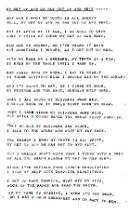 |
| A humorous poem written by
Mr. Siegfried about aging (click to enlarge) |
William Siegfried:
My chauffeur passed away.
Arthur Siegfried: Do
you remember years ago somebody asked you if you went to the doctor and
you said, "No, I didn't go to my doctor," and they said,
"Why not?" Remember what you said? "The doctor died so I
stopped going to him."
Flora Higgins: Well, I'm sure
people are always asking you, you are 104: how come you are so youthful
and healthy and alert and over 100 years old? Do you have any reasons
for that? You're a very hard worker, I can see that.
William Siegfried: I
really don't know.
Flora Higgins: Well,
congratulations to you anyway, and thank you for sharing your memories
with us. It's been a pleasure.
William Siegfried:
Thanks for coming.
Flora Higgins: And
thanks to you too, Mr. Arthur Siegfried, for helping us and
facilitating.
|